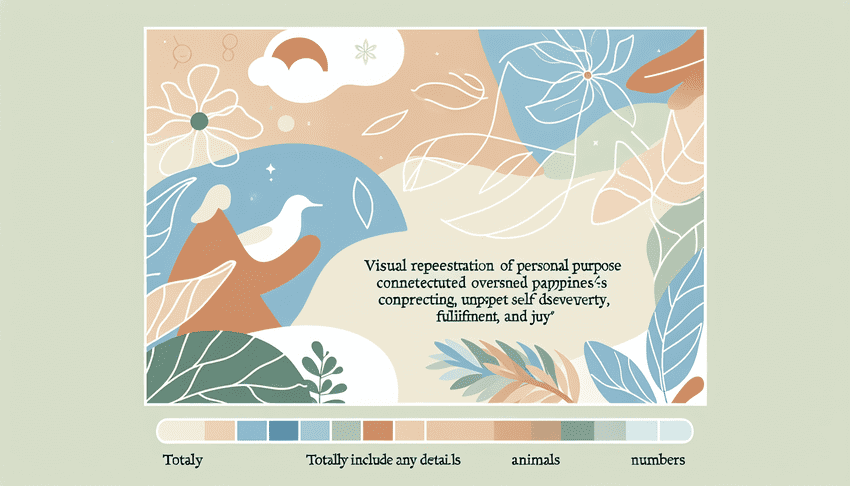Table of Contents
Unveiling Personal Purpose

The Quest for Meaning in Daily Pursuits
Discovering one’s Life Purpose can often feel like an elusive journey, yet it is an integral quest that imbues our daily pursuits with meaning and fulfillment. The science of Positive Psychology has contributed valuable insights into how the mundane can transcend into the meaningful, enlightening paths to happiness through alignment with our core values and aspirations.
Finding Meaning in the Mundane Reflect on your routine; each task, whether it’s brewing your morning cup of coffee or drafting emails at work, has the potential to connect with your Life Purpose. The secret lies in shifting focus from the act itself to its significance in the larger tapestry of your life. It is not the action, but the intention and value placed upon it, that weaves depth into the fabric of our daily existence. This clarity transforms a mere to-do list into a journey aligned with personal growth and satisfaction.
Aligning Daily Actions with Life Goals Cultivating a harmonious relationship between daily routines and long-term goals can amplify your sense of purpose. Integrating the concept of ‘micro-goals’—small, actionable steps that are coherent with your Life Purpose—within day-to-day tasks, not only brings you closer to your aspirations but also infuses each day with a sense of progression and achievement.
- Practice Gratitude: Start your day by reflecting on what you are grateful for, connecting your daily pursuits to a positive framework.
- Intention Setting: Define clear intentions for how you wish to approach your tasks, ensuring they reflect your values and contribute to your larger objectives.
- Purposeful Engagement: Choose to engage in activities that resonate with your inner self, turning even the most mundane chores into acts of self-realization.
Transforming Responsibilities into Sources of Fulfillment Imagine achieving a state where responsibilities are no longer burdens but become opportunities for personal empowerment. This can be attained by aligning responsibilities with intrinsic motivations. For instance, seeing a project at work as a chance to learn and contribute to the wellbeing of others can make the task deeply satisfying and intricately connected to your Life Purpose.
Emotional Intelligence in Navigating Life Purpose High Emotional Intelligence (E) plays a pivotal role in identifying and pursuing your Life Purpose. It entails recognizing your own emotions and those of others, which in turn fosters a sense of empathy and connection. Utilizing E to discern your genuine passions and how they can manifest in everyday tasks is key to constructing a life of contentment and purpose.
In conclusion, understanding and aligning with your Life Purpose need not be a grandiose quest detached from reality. It is found in the interstices of daily life, by endowing routine with personal significance and ambition. When you master the art of aligning the ordinary with your extraordinary vision, every day becomes a stepping stone towards a fulfilled and happy existence.
Setting Meaningful Goals in Alignment with Purpose
Discovering Personal Purpose can shine a guiding light on the path of life, transforming how we set our goals and igniting the fire of motivation within us. When we align our aspirations with a Purpose-Driven Life, we’re not just ticking off boxes on a checklist; we’re embarking on a Happiness Journey that blends ambition with inner fulfillment.
Aligning Goals with Life’s Purpose The alignment process begins deep within, where your dreams and values live. It’s about marrying your ambitions with your Life Meaning Happiness. Imagine an entrepreneur who’s passionate about environmental sustainability. By setting a goal to launch a line of eco-friendly products, they are not only chasing a business milestone but also staying true to their personal mission, thus magnifying their sense of Personal Fulfillment.
- Crafting goals that reflect who you are can be a source of boundless energy and perseverance.
- Setting personal benchmarks that resonate with your core beliefs leads to more enthusiasm and engagement.
- When obstacles arise, a purpose-filled resolve acts as the backbone to overcome them.
The Power of Purpose-Driven Goals in Action Consider the story of an educator determined to change the way children learn. By aiming to integrate emotional intelligence into the curriculum, their goal directly impacts students’ lives. The satisfaction gained from knowing they are contributing to a larger societal good encapsulates the essence of a Purpose-Driven Life, steeped in meaning and gratification.
- Choosing goals that contribute to greater societal value ensures a legacy beyond personal gains.
- Witnessing tangible results from goals that transcend one’s own needs can amplify a sense of achievement.
Strategies for Identifying Purpose-Aligned Goals Identifying goals that resonate with your life’s purpose entails introspection and may require pivoting from conventional metrics of success. It’s about asking yourself what brings you Life Meaning Happiness and how your personal and professional endeavors can reflect that.
- Journaling and reflection exercises can unveil latent passions and values driving your Purpose-Driven Life.
- Mentors and role models can offer insight into how they’ve woven their purpose into their success stories.
- Outreach and community engagement can reveal areas where your skills and passions intersect with the world’s needs.
Conclusion Bridging the gap between mere aspirations and purpose-aligned goals is a transformative process. It changes the narrative from a singular pursuit of success to a rich tapestry of Personal Fulfillment and Happiness Journey. Embrace your inner calling and let your purpose light the way to goals that matter not just to you, but also to the world. This way, success becomes a byproduct of a life well-lived, marked by contentment and joy.
Emotional Intelligence and Its Influence on Happiness

Understanding and Regulating Emotions for Well-being
Emotional Intelligence: The Bedrock of Meaning and Fulfillment
Life Purpose often acts as an anchor, giving us a sense of direction and fulfillment. In the pursuit of happiness and a meaningful existence, Emotional Intelligence (EI) plays a paramount role. It is through EI that we learn to navigate the turbulent waters of our inner emotional world as well as the complexities of interpersonal relationships.
- Mastering Self-Awareness
- Nurturing Self-Regulation
- Empathy: Understanding Others
At the heart of EI lies self-awareness, the foundational skill that allows us to identify our feelings accurately. Consider Sarah, a project manager who notices her frustration growing during a meeting with a client who is dismissive of her team’s efforts. By recognizing the emotion, Sarah can decide to take a brief walk after the meeting, de-escalate her emotions, and plan a constructive response, ensuring the situation doesn’t impair her professional relationships or personal well-being.
Turning Emotional Awareness into Action
Equally important in the Emotional Intelligence framework is self-regulation. After recognizing one’s emotions, the ability to manage them is critical. Jack, an ER nurse, often experiences high levels of stress. Instead of succumbing to the pressure, he has learned to take deep breaths and prioritize tasks during emergencies. His self-regulation doesn’t just calm his own nerves; it also instills a sense of confidence and calm in his team.
Empathy: The Bridge to Connection
Empathy, the ability to comprehend what others might be feeling, is another facet of EI that enriches our relationships. Take, for example, Ava, a teacher who notices a student becoming increasingly withdrawn. By empathetically engaging with the student, she discovers that he is dealing with a family crisis. By acknowledging his situation and offering support, Ava fosters a trustworthy teacher-student relationship, which can significantly affect the student’s engagement and success in school.
Life Purpose is intricately linked to the quality of our relationships and our capacity to handle the emotional landscapes within and around us. As individuals like Sarah, Jack, and Ava demonstrate, mastering Emotional Intelligence does not only contribute to personal resilience and communication skills but also helps in forging deeper connections with others—bringing us closer to a life of purpose and happiness. Through these practical scenarios, we can see the profound impact that EI has on our ability to live a fulfilled life that is in tune with our aspirations and goals.
Empathy and Social Connection as Pillars of Joy
Discovering your Life Purpose can be a transformative journey that empowers happiness and profound fulfillment. In the realm of Positive Psychology, the pursuit of personal meaning and direction is often closely linked to the development of empathy and strong social connections.
- Empathy: A Bridge to Human Connection
Understanding Empathy in Positive Psychology
At the heart of human connection lies empathy, an emotional skill that enables us to understand and share the feelings of others. Empathy acts as a bridge, not just enabling us to comprehend another’s experiences, but also facilitating deeper emotional bonds that are essential for communal living. In the lens of Positive Psychology, empathy is a vital component in the architecture of supportive relationships that add value and purpose to our lives.
- Empathy and Life Purpose in Action
Real-World Examples of Empathy Fueling Purpose
Consider the case of a healthcare professional whose Life Purpose revolves around aiding the recovery of their patients. Without empathy, the caregiver’s task becomes a mere job. However, by embracing empathy, each interaction with a patient becomes an opportunity to affirm their calling. Another example is found in educators who, by empathizing with their students, not only impart knowledge but also sculpt the minds and hearts of future generations, thereby finding meaning in their own lives.
- Social Connectivity: The Fabric of Happiness
How Social Bonds Forge Life Purpose
The threads of social connectivity weave individuals into the broader tapestry of community. According to Positive Psychology, our connections enrich our lives, giving us a stronger sense of belonging and contributing to our Life Purpose. When we interact with others, we share experiences, values, and aspirations which can reinforce our sense of identity and direction. It is through these shared moments that we often discover and refine our own Life Purpose.
- Building a Purpose-Driven Community
Real-Life Examples of Community Engagement
Take, for instance, the rise of community gardens in urban spaces. For many, these green havens represent more than just a place to cultivate plants; they’re a ground for nurturing community spirit, teaching responsibility, and promoting environmental values. Each gardener may find their Life Purpose in the growth of their plants, the smiles of their neighbors, or the education of local children about sustainable practices.
In conclusion, empathy and social connectivity are not just buzzwords in the realm of Positive Psychology; they are foundational elements to discovering and living a Life Purpose. The capacity to empathize contributes significantly to our well-being, and robust social ties provide the context within which we can pursue meaningful lives. By focusing on these aspects, each person has the potential to carve out a Life Purpose that is not only personally satisfying but also beneficial to the greater community.
Summary
Reflect on the day-to-day moments; even the act of sipping morning coffee can spark a connection with your life’s purpose. This journey of finding meaning in the mundane pivots on understanding the value and intention behind our actions, rather than the actions themselves. By doing this, a seemingly repetitive routine becomes a path lined with personal growth and joyful discovery.
Fulfillment through Daily Intentions
Crafting a life where everyday actions resonate with our deepest goals requires setting ‘micro-goals’. These miniature objectives, when aligned with our overarching aspirations, render daily tasks as steps towards fulfillment and happiness.
- Practice gratitude, framing your day with an appreciation of the positives.
- Setting intentions ensures tasks are completed with a reflection of your values and broader life ambitions.
- Engage in daily activities that resonate with your true nature, infusing even mundane actions with meaning.
Responsibilities as Opportunities
When viewed through the lens of purpose and intrinsic motivation, responsibilities transform into chances for empowerment. A project at work isn’t merely a task but an occasion to learn, grow, and contribute to others’ welfare, linking directly to your life’s calling.
Emotional intelligence (EI) takes a central role in navigating toward your life’s purpose. It involves understanding your own emotions and those of others, promoting empathy and connection.
Empathy and Connection
Empathy is crucial in Positive Psychology, not simply for understanding others but as a pathway to meaningful relationships and a purpose-driven life. By genuinely connecting with others, we deepen social bonds and discover nuances in our own life’s narrative.
- Use empathy to bridge gaps and foster strong interpersonal relationships.
Transforming Empathy into Life Purpose
A caregiver finds purpose in every patient interaction by employing empathy, which reinforces their calling. Similarly, teachers draw meaning from empathizing with students, shaping the next generation’s minds.
- Shared experiences and values from social connections enrich our life’s purpose.
Social Connectivity and Community
Community engagement, like urban community gardens, serves as an example of how shared spaces can promote responsibility, nurture community spirit, and align with individual and collective purposes.
In summary, integrating empathy and social connectivity, core tenets of Positive Psychology, can lead to a fulfilling life purpose. The ability to empathize with others can amplify our happiness, and strong social ties provide a context for pursuing a meaningful existence. This emphasis on collective well-being encourages readers to explore more about how their individual stories intersect with the community’s larger narrative, fostering a desire for deeper engagement with articles that nurture this connection.
FAQ – Finding Purpose and Meaning
How can an individual effectively identify their personal purpose and in what ways does this align with their pursuit of happiness?
An individual can effectively identify their personal purpose by reflecting on activities that bring deep fulfillment and align with core values, often uncovered through explorations such as journaling, mindfulness practices, or even career coaching. This pursuit aligns with happiness as it creates congruence between one’s actions and beliefs, leading to sustained engagement and satisfaction in life’s endeavors – a concept at the heart of positive psychology known as ‘authenticity’. By living authentically and with purpose, individuals often report heightened well-being and a greater sense of life satisfaction, illustrating the profound connection between personal purpose and happiness.
How can one effectively align their daily actions and long-term goals with their discovered personal purpose to enhance overall happiness?
To effectively align daily actions and long-term goals with one’s personal purpose, begin by creating a clear vision of your ideal future that resonates with your core values and brings a sense of fulfillment. Break this vision down into manageable objectives and incorporate them into daily routines through small, purpose-driven habits, ensuring consistent progress and reinforcing a positive feedback loop that enhances overall happiness. By regularly reflecting on these actions and maintaining flexibility to adapt to life’s changing circumstances, you can stay true to your purpose and cultivate an enduring sense of satisfaction and well-being.
How can one practically identify their personal purpose, and in what specific ways does such a discovery contribute to their overall sense of happiness?
Discovering one’s personal purpose can be a transformative journey, beginning with introspection—reflecting on moments of deep satisfaction and joy, identifying core values and passions, and considering the unique impact one wants to make in the world. This self-awareness can be bolstered by trying new experiences, seeking feedback from trusted peers, and creating a personal vision statement. The exhilaration of uncovering and pursuing one’s purpose fuels enduring happiness by aligning daily actions with deeper meaning, offering a clear direction, and fostering a sense of accomplishment, belonging, and contribution to something larger than oneself.




